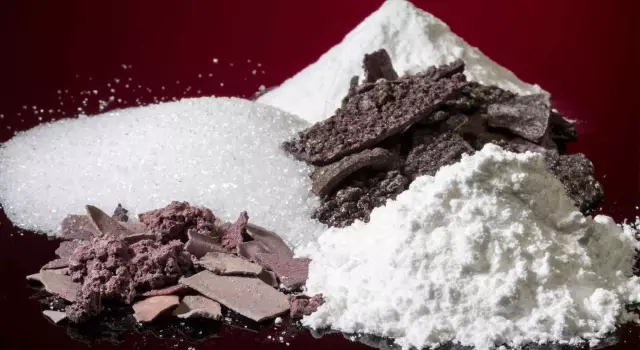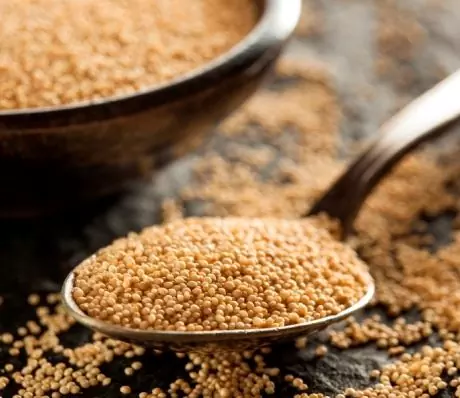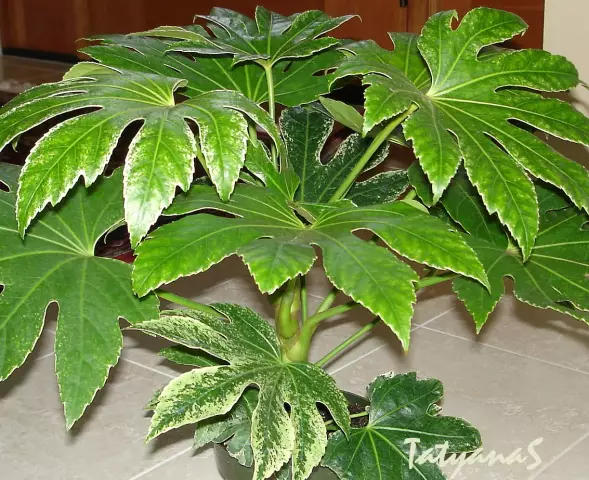- Author Rachel Wainwright [email protected].
- Public 2023-12-15 07:39.
- Last modified 2025-11-02 20:14.
Aralia Manchu
Instructions for use:
- 1. Chemical composition
- 2. Useful properties
- 3. Indications for use
- 4. Contraindications
- 5. Home remedies

Manchurian Aralia is a shrub from the Araliev family (popular name: tall aralia, devil or thorn tree). From the leaves, bark and roots of the tree, preparations are made that have an effect on the central nervous system.
Chemical composition
For therapeutic purposes, the leaves, bark and root of aralia are used.
Substances contained in the leaves of aralia: alkaloids, carbohydrates, essential oils, flavonoids, organic acids.
Substances contained in aralia root: vitamins, mineral compounds, essential oils, proteins, starch, carbohydrates, trace elements, saponins, glycosides, alkaloids.
Beneficial features
The pharmacological properties of Manchurian aralia are determined by its rich chemical composition, due to which preparations based on it have a certain effect on the body:
- Starch (helps to reduce cholesterol levels, accelerate metabolic processes, normalize blood pressure, improve digestion, protect the gastrointestinal mucosa);
- Essential oils (have anti-inflammatory, antiseptic, expectorant, antispasmodic, diuretic, sedative effect);
- Phytosterols (steroid components of plants) (serve as a substrate for the formation of steroid hormones, vitamin D, bile acids; are able to change the consistency of cell membranes, regulate the work of endocrine glands, stabilize the state of the nervous system, produce hypoglycemic, anti-inflammatory and immunoregulatory effects);
- Flavonoids (strengthen capillaries, eliminate spasms, provide growth and nutrition of the heart muscle, stimulate the antitoxic activity of the liver, lower blood pressure, have a choleretic, diuretic and hemostatic effect);
- Resins (have wound healing, antibacterial and laxative properties);
- Ascorbic acid (vitamin C) (is a powerful natural antioxidant, contributes to the regulation of blood clotting, lipid concentration, saccharide metabolism; participates in the production of interferon, in the synthesis of collagen, bone tissue, steroid hormones, in the activation of the immune system, increases the antiviral response and reduces activity allergens);
- Tannins (have antimicrobial, vasopressive, astringent and anti-inflammatory effects);
- Thiamin (vitamin B 1) (reduces the degree of manifestation of depression and other mental pathologies, stimulates brain activity, improving the ability to learn);
- Riboflavin (Vitamin B 2) (involved in the process of normalization, the recovery of mucous membranes, energy production from saccharides and fats, reduces stress and tension, protects nerve cells from damage, it is effective to maintain the firmness and elasticity of the epidermis);
- Trace elements: magnesium, calcium, potassium, iron, molybdenum, zinc, copper, manganese, chromium, nickel, aluminum, selenium, tungsten, strontium (play an important role in the life of the body);
- Aralosides A, B and C (triterpene saponins, derivatives of olealonic acid; Manchurian aralia is the main natural source of aralosides) (increase physical activity, excitability, eliminate the inhibitory effect of chlorpromazine, improve the work of the heart muscle).
Due to its properties, Manchurian aralia has a significant effect on the central nervous system (more effective than eleutherococcus and ginseng), while it does not significantly affect blood pressure, stimulates respiratory activity and helps to increase the strength of heart contractions.
The use of the medicinal properties of the plant is necessary to obtain the following effects:
- General tonic;
- Stimulating;
- Hypertensive;
- General strengthening;
- Immunomodulatory;
- Exciting;
- Hypoglycemic.
Preparations containing Manchurian aralia are recommended to be used by patients whose work activity requires high coordination of movements and increased concentration of attention.
Indications for use
- Circulatory system: vegetative-vascular dystonia, rheumatism, anemia;
- Respiratory system: infectious and inflammatory diseases such as acute respiratory infections, influenza, laryngitis, chronic tonsillitis, rhinitis, pneumonia (to increase immunity);
- CNS: asthenia, depression, chronic fatigue syndrome, overwork, complications due to traumatic brain injury;
- Endocrine system: diabetes mellitus, hypothyroidism;
- Urinary system: chronic glomerulonephritis;
- Skin system: pustular skin lesions;
- Reproductive system: inflammation of the prostate, impotence, menstrual irregularities.
Contraindications
It is undesirable to use Manchu Aralia without a doctor's prescription and in the following diseases / conditions:
- Insomnia;
- Epilepsy;
- Increased nervous irritability;
- Arterial hypertension;
- Hyperkinesis.
To avoid problems with sleep, the tincture is not recommended to be taken at night.
If the Manchurian aralia is used incorrectly, due to its overdose, nausea, loss of consciousness, and respiratory failure may occur. If these symptoms occur, treatment should be discontinued.
Home remedies from Manchu Aralia
Tincture of aralia manchurian root on alcohol
To prepare the tincture, you need to take 40 g of roots and pour them 200 ml of 70% alcohol. The medicine is insisted for two weeks, after which it is filtered, the roots are squeezed out. The finished tincture has a specific smell, amber color. Take it 35-40 drops 3 times a day for a month. With a tendency to high blood pressure, the dosage should be reduced to 10 drops and taken 2 times a day. The duration of treatment is no more than 3 weeks.
The tincture is used to treat asthenia, chronic neurological and neurotic diseases, physical and mental fatigue, impotence, low blood pressure, as well as to recover from injuries. The remedy is effective for sclerosis, diabetes, atherosclerosis, schizophrenia. With regular intake of the tincture, there is an improvement in appetite, sleep and performance, a decrease in heart and headaches. The remedy also helps with skin diseases associated with high blood pressure, asthenia, metabolic disorders.
Manchurian aralia broth
To prepare the broth, take 20 g of raw materials, pour 200 ml of hot water, boil for 30 minutes, then incubate for 10 minutes at room temperature, squeeze, filter and dilute with boiled water until the original volume is obtained. Take 3 times a day before meals, 1 tablespoon for two or three weeks. Such a decoction is useful for diseases of the gastrointestinal tract, colds, inflammation of the mucous membranes of the mouth, enuresis, weakened immunity. The medicine is effective in kidney disease, because it has a diuretic effect.
You can store the broth in the refrigerator for no more than three days.
Information about the drug is generalized, provided for informational purposes only and does not replace the official instructions. Self-medication is hazardous to health!






